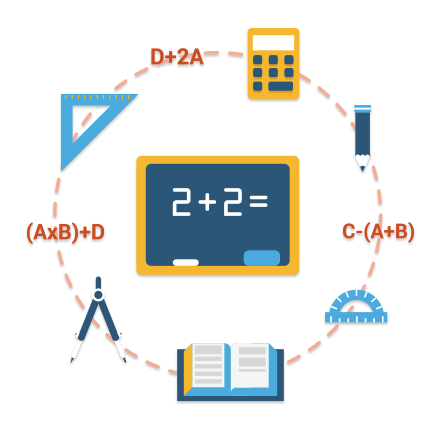Key Stage 4 - KS4 Maths
If you decide to study maths at a higher level you will begin to see what Key Stage 4 is all about, Key Stage 4 mathematics consists of foundation mathematics and higher mathematics. At foundation level the majority of topics you will have already of seen at previous stages and levels, you will revisit topics such as decimals, fractions, indices/exponents, geometry and algebraic expressions and fractions. In addition to all of these, you will be introduced to some new areas of maths that include statistics and statistic-probability. In relation to statistics, you will be taught how to create scatter diagrams, stem and leaf plots and frequency distribution tables. You will also be expected to become comfortable with probability and the probability of simple events, rolling a dice and experimental probability. Towards the end of Key Stage 4 once you are completely comfortable with algebra and algebraic expressions you will be introduced to quadratic equations, quadratic equations with factorisation and learn how to solve quadratic equations. As you can see Key Stage 4 mathematics progresses onto another level in comparison to previous stages, thus, it is important to remember that here at Futureschool we are always here to give you help and guidance!
.Popular Maths Curriculum Courses in England.
Key Stage 4
Foundation Maths
Experimental probability, relative frequency, equations involving grouping symbols are some of the areas taught in Foundation Maths.
Key Stage 4
Higher Mathematics
At Higher Mathematics you will be taught surds, surface are formulae and you will also be introduced to circle geometry.
Key Stage 5
Core Mathematics
You will learn algebra-polynomials, polynomial equations, the remainder theorem, absolute value and roots quad equations.
Key Stage 5
Statistics Mathematics
Your studies at this stage will comprise of grouped data, range and dispersion, standard deviation and general statistic probability.



KS 4 Maths Topics
#
TOPIC
TITLE
1
Multiplication
Multiplying 4-digit numbers by 3-digit numbers
Objective: On completion of the lesson the student will be able to multiply any 4 digit numbers by any 3 digit numbers using long multiplication.
2
Multiplication
Multiplying 4-digit numbers by 4-digit number
Objective: On completion of the lesson the student will be able to be able to multiply any 4 digit number by any other 4 digit number using long multiplication.
3
Decimals
Multiplying decimals by 10, 100 and 1000
Objective: On completion of the lesson the student will be able to multiply decimal numbers by one hundred and recognise the pattern formed when decimals are multiplied by ten, one hundred and one thousand.
4
Division/repeat subtraction
Repeated subtraction with divisors greater than 20 with remainders as fractions
Objective: On completion of the lesson the student will be able to use long division by repeated subtraction with divisors greater than 20 and remainders expressed as fractions
5
Division/repeat subtraction
Repeated subtraction with divisors less than 35 with some remainders
Objective: On completion of the lesson the student will be able to use long division by repeated subtraction with divisors less than 35, with some remainders.
6
Division/repeat subtraction
Repeated subtraction with divisors less than 55 with dividends of 3 and 4-digits with some remainders
Objective: On completion of the lesson the student will be able to use long division by repeated subtraction with divisors less than 55 and where dividends are 3 and 4 digit numbers, and there are some remainders.
7
Division/repeat subtraction
Repeated subtraction with divisors greater than 50 with dividends of thousands and some remainders
Objective: On completion of the lesson the student will able to use Long Division by repeated subtraction with divisors greater than 50 including division of thousands, and some remainders.
8
Division/repeat subtraction
Using divide, multiply and subtraction in the bring down method
Objective: On completion of the lesson the student will be able to use Long Division using the Divide, Multiply, Subtract and Bring Down method.
9
Decimals
Dividing decimals by 10, 100 and 1000
Objective: On completion of the lesson the student will be able to divide decimal numbers by one hundred and recognise the pattern formed when decimals are divided by ten, one hundred and one thousand.
10
Algebraic expressions
Directed numbers: addition and subtraction.
Objective: On completion of the lesson the student will be able to add and subtract positive and negative numbers in any combination, and understand adding and subtracting positive and negative pronumerals.
| # | TOPIC | TITLE | |
|---|---|---|---|
| 1 | Multiplication | Multiplying 4-digit numbers by 3-digit numbers | |
| Objective: On completion of the lesson the student will be able to multiply any 4 digit numbers by any 3 digit numbers using long multiplication. | |||
| 2 | Multiplication | Multiplying 4-digit numbers by 4-digit number | |
| Objective: On completion of the lesson the student will be able to be able to multiply any 4 digit number by any other 4 digit number using long multiplication. | |||
| 3 | Decimals | Multiplying decimals by 10, 100 and 1000 | |
| Objective: On completion of the lesson the student will be able to multiply decimal numbers by one hundred and recognise the pattern formed when decimals are multiplied by ten, one hundred and one thousand. | |||
| 4 | Division/repeat subtraction | Repeated subtraction with divisors greater than 20 with remainders as fractions | |
| Objective: On completion of the lesson the student will be able to use long division by repeated subtraction with divisors greater than 20 and remainders expressed as fractions | |||
| 5 | Division/repeat subtraction | Repeated subtraction with divisors less than 35 with some remainders | |
| Objective: On completion of the lesson the student will be able to use long division by repeated subtraction with divisors less than 35, with some remainders. | |||
| 6 | Division/repeat subtraction | Repeated subtraction with divisors less than 55 with dividends of 3 and 4-digits with some remainders | |
| Objective: On completion of the lesson the student will be able to use long division by repeated subtraction with divisors less than 55 and where dividends are 3 and 4 digit numbers, and there are some remainders. | |||
| 7 | Division/repeat subtraction | Repeated subtraction with divisors greater than 50 with dividends of thousands and some remainders | |
| Objective: On completion of the lesson the student will able to use Long Division by repeated subtraction with divisors greater than 50 including division of thousands, and some remainders. | |||
| 8 | Division/repeat subtraction | Using divide, multiply and subtraction in the bring down method | |
| Objective: On completion of the lesson the student will be able to use Long Division using the Divide, Multiply, Subtract and Bring Down method. | |||
| 9 | Decimals | Dividing decimals by 10, 100 and 1000 | |
| Objective: On completion of the lesson the student will be able to divide decimal numbers by one hundred and recognise the pattern formed when decimals are divided by ten, one hundred and one thousand. | |||
| 10 | Algebraic expressions | Directed numbers: addition and subtraction. | |
| Objective: On completion of the lesson the student will be able to add and subtract positive and negative numbers in any combination, and understand adding and subtracting positive and negative pronumerals. | |||
See More Topics Covered in Key Stage 4
..









